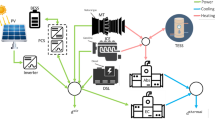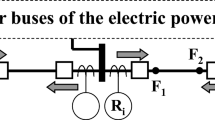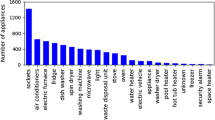Abstract
To manage renewable generation and load consumption uncertainty, chance-constrained optimal power flow (OPF) formulations have been proposed. However, conventional solution approaches often rely on accurate estimates of uncertainty distributions, which are rarely available in reality. When the distributions are not known but can be limited to a set of plausible candidates, termed an ambiguity set, distributionally robust (DR) optimization can reduce out-of-sample violation of chance constraints. Nevertheless, a DR model may yield conservative solutions if the ambiguity set is too large. In view that most practical uncertainty distributions for renewable generation are unimodal, in this paper, we integrate unimodality into a moment-based ambiguity set to reduce the conservatism of a DR-OPF model. We review exact reformulations, approximations, and an online algorithm for solving this model. We extend these results to derive a new, offline solution algorithm. Specifically, this algorithm uses a parameter selection approach that searches for an optimal approximation of the DR-OPF model before solving it. This significantly improves the computational efficiency and solution quality. We evaluate the performance of the offline algorithm against existing solution approaches for DR-OPF using modified IEEE 118-bus and 300-bus systems with high penetrations of renewable generation. Results show that including unimodality reduces solution conservatism and cost without degrading reliability significantly.









Similar content being viewed by others
Notes
To handle uncertain loads, we denote \(P_L^f\) and \({\tilde{d}}\) as the load forecast and the uncertain load forecast error, respectively. We substitute the vector of loads \(P_L\) with \(P_L^f+{\tilde{d}}\) and the system uncertainty \({\tilde{w}}\) with \({\tilde{w}} + {\tilde{d}}\) in formulation (12). Then, we can use the same reformulation method and solution algorithm as described in Section 4 to solve this extended model.
Note that each intermediate solution comes from a relaxed approximation and so the objective cost is lower than the true objective cost. Here we use a negative optimality gap to illustrate this relation.
References
Ahmed S, Shapiro A (2008) Solving chance-constrained stochastic programs via sampling and integer programming. In: State-of-the-art decision-making tools in the information-intensive age. INFORMS TutORials Oper Res:261–269
Arrigo A, Kazempour J, De Grève Z, Toubeau J.-F, Vallée F (2021) Embedding dependencies within distributionally robust optimization of modern power systems. arXiv preprint arXiv:2104.08101
Arrigo A, Ordoudis C, Kazempour J, De Grève Z, Toubeau J-F, Vallée F (2022) Wasserstein distributionally robust chance-constrained optimization for energy and reserve dispatch: an exact and physically-bounded formulation. Eur J Oper Res 296(1):304–322
Baker K, Bernstein A (2019) Joint chance constraints in ac optimal power flow: improving bounds through learning. IEEE Trans Smart Grid 10(6):6376–6385
Bienstock D, Chertkov M, Harnett S (2014) Chance-constrained optimal power flow: risk-aware network control under uncertainty. SIAM Rev 56(3):461–495
Campi M, Calafiore G, Prandini M (2009) The scenario approach for systems and control design. Annu Rev Control 33(2):149–157
Charnes A, Cooper W, Symonds G (1958) Cost horizons and certainty equivalents: an approach to stochastic programming of heating oil. Manage Sci 4(3):235–263
Coffrin C, Gordon D, Scott P (2016) NESTA, the NICTA energy system test case archive. arXiv preprint arXiv:1411.0359v5
Cox MG (1971) An algorithm for approximating convex functions by means by first degree splines. Comput J 14(3):272–275
Delage E, Ye Y (2010) Distributionally robust optimization under moment uncertainty with application to data-driven problems. Oper Res 58(3):595–612
Dharmadhikari SW, Joag-Dev K (1988) Unimodality, convexity, and applications. Academic Press, Cambridge
Duan C, Fang W, Jiang L, Yao L, Liu J (2018) Distributionally robust chance-constrained approximate AC-OPF with Wasserstein metric. IEEE Trans Power Syst 33(5):4924–4936
Esteban-Pérez A, Morales J.M (2021) Distributionally robust optimal power flow with contextual information. arXiv preprint arXiv:2109.07896
Gavrilović MM (1975) Optimal approximation of convex curves by functions which are piecewise linear. J Math Anal Appl 52(2):260–282
Ghaoui LE, Oks M, Oustry F (2003) Worst-case value-at-risk and robust portfolio optimization: a conic programming approach. Oper Res 51(4):543–556
Grant M, Boyd S (2008) Graph implementations for nonsmooth convex programs. In: Recent Advances in Learning and Control. Lecture Notes in Control and Information Sciences
Grant M, Boyd S (2014) CVX: matlab software for disciplined convex programming, version 2.1. http://cvxr.com/cvx
Guo Y, Baker K, Dall’Anese E, Hu Z, Summers TH (2018) Data-based distributionally robust stochastic optimal power flow - Part II: case studies. IEEE Trans Power Syst 34(2):1493–1503
Guo Y, Baker K, Dall’Anese E, Hu Z, Summers T (2018) Stochastic optimal power flow based on data-driven distributionally robust optimization. In: IEEE Annual American Control Conference, Milwaukee, WI
Guo Y, Baker K, Dall’Anese E, Hu Z, Summers TH (2019) Data-based distributionally robust stochastic optimal power flow - Part I: methodologies. IEEE Trans Power Syst 34(2):1483–1492
Hou A.M, Roald L.A (2020) Chance constraint tuning for optimal power flow. In: 2020 International Conference on Probabilistic Methods Applied to Power Systems (PMAPS), pp. 1–6. IEEE
Huang W, Zheng W, Hill DJ (2021) Distributionally robust optimal power flow in multi-microgrids with decomposition and guaranteed convergence. IEEE Trans Smart Grid 12(1):43–55
Imamoto A, Tang B (2008) A recursive descent algorithm for finding the optimal minimax piecewise linear approximation of convex functions. In: World Congress on Engineering and Computer Science, San Francisco, CA
Jabr RA (2013) Adjustable robust OPF with renewable energy sources. IEEE Trans Power Syst 28(4):4742–4751
Jabr RA (2020) Distributionally robust cvar constraints for power flow optimization. IEEE Trans Power Syst 35(5):3764–3773
Jensen TV, Pinson P (2017) Re-Europe, a large-scale dataset for modeling a highly renewable European electricity system. Sci data 4:170–175
Jiang R, Guan Y (2016) Data-driven chance constrained stochastic program. Math Program 158(1):291–327
Li B (2019) Distributionally robust optimal power flow with strengthened ambiguity sets. PhD thesis, University of Michigan Ann Arbor
Li B, Jiang R, Mathieu J.L (2016) Distributionally robust risk-constrained optimal power flow using moment and unimodality information. In: IEEE Conference on Decision and Control, Las Vegas, NV
Li B, Mathieu J.L, Jiang R (2018) Distributionally robust chance constrained optimal power flow assuming log-concave distributions. In: Power Systems Computation Conference, Dublin, Ireland
Li B, Vrakopoulou M, Mathieu JL (2019a) Chance constrained reserve scheduling using uncertain controllable loads Part II: analytical reformulation. IEEE Trans Smart Grid 10(2):1618–1625
Li B, Jiang R, Mathieu JL (2019b) Ambiguous risk constraints with moment and unimodality information. Math Program 173(1–2):151–192
Li B, Jiang R, Mathieu JL (2019c) Distributionally robust chance-constrained optimal power flow assuming unimodal distributions with misspecified modes. IEEE Trans Control Netw Syst 6(3):1223–1234
Lu X, Chan KW, Xia S, Zhou B, Luo X (2019) Security-constrained multi-period economic dispatch with renewable energy utilizing distributionally robust optimization. IEEE Trans Sustain Energy 10(2):768–779
Lubin M, Dvorkin Y, Backhaus S (2016) A robust approach to chance constrained optimal power flow with renewable generation. IEEE Trans Power Syst 31(5):3840–3849
Margellos K, Goulart P, Lygeros J (2014) On the road between robust optimization and the scenario approach for chance constrained optimization problems. IEEE Trans Autom Control 59(8):2258–2263
Mieth R, Dvorkin Y (2018) Data-driven distributionally robust optimal power flow for distribution systems. IEEE Control Syst Lett 2(3):363–368
Miller B, Wagner H (1965) Chance constrained programming with joint constraints. Oper Res 13(6):930–945
Ordoudis C, Nguyen VA, Kuhn D, Pinson P (2021) Energy and reserve dispatch with distributionally robust joint chance constraints. Oper Res Lett 49(3):291–299
Pagnoncelli BK, Ahmed S, Shapiro A (2009) Sample average approximation method for chance constrained programming: theory and applications. J Optim Theory Appl 142(2):399–416
Papaefthymiou G, Klockl B (2008) MCMC for wind power simulation. IEEE Trans Energy Conv 23(1):234–240
Pourahmadi F, Kazempour J (2021) Distributionally robust generation expansion planning with unimodality and risk constraints. IEEE Trans Power Syst 36(5):4281–4295
Roald L, Oldewurtel F, Krause T, Andersson G (2013) Analytical reformulation of security constrained optimal power flow with probabilistic constraints. In: IEEE PowerTech Conference, Grenoble, France
Roald L, Oldewurtel F, Parys B.V, Andersson G (2015) Security constrained optimal power flow with distributionally robust chance constraints. arXiv preprint arXiv:1508.06061
Stellato B (2014) Data-driven Chance Constrained Optimization. Master thesis, ETH Zurich
Summers T, Warrington J, Morari M, Lygeros J (2015) Stochastic optimal power flow based on conditional value at risk and distributional robustness. Int J Elect Power Energy Syst 72:116–125
Tong X, Sun H, Luo X, Zheng Q (2018) Distributionally robust chance constrained optimization for economic dispatch in renewable energy integrated systems. J Global Optim 70(1):131–158
Vandewalle J (1975) On the calculation of the piecewise linear approximation to a discrete function. IEEE Trans Comput 24:843–846
Vrakopoulou M, Margellos K, Lygeros J, Andersson G (2013) A probabilistic framework for reserve scheduling and N-1 security assessment of systems with high wind power penetration. IEEE Trans Power Syst 28(4):3885–3896
Vrakopoulou M, Li B, Mathieu JL (2019) Chance constrained reserve scheduling using uncertain controllable loads Part I: formulation and scenario-based analysis. IEEE Trans Smart Grid 10(2):1608–1617
Wagner M (2008) Stochastic 0–1 linear programming under limited distributional information. Oper Res Lett 36(2):150–156
Wang C, Gao R, Qiu F, Wang J, Xin L (2018) Risk-based distributionally robust optimal power flow with dynamic line rating. IEEE Trans Power Syst 33(6):6074-6086
Xie W, Ahmed S (2018) Distributionally robust chance constrained optimal power flow with renewables: a conic reformulation. IEEE Trans Power Syst 33(2):1860–1867
Xie W, Ahmed S, Jiang R (2019) Optimized bonferroni approximations of distributionally robust joint chance constraints. Math. Program: 1–34
Zhang H, Li P (2011) Chance constrained programming for optimal power flow under uncertainty. IEEE Trans Power Syst 26(4):2417–2424
Zhang Y, Shen S, Mathieu JL (2017) Distributionally robust chance-constrained optimal power flow with uncertain renewables and uncertain reserves provided by loads. IEEE Trans Power Syst 32(2):1378–1388
Acknowledgements
This research was supported by the U.S. National Science Foundation Awards CCF-1442495 and CMMI-1662774.
Author information
Authors and Affiliations
Corresponding author
Additional information
Publisher's Note
Springer Nature remains neutral with regard to jurisdictional claims in published maps and institutional affiliations.
Rights and permissions
About this article
Cite this article
Li, B., Jiang, R. & Mathieu, J.L. Integrating unimodality into distributionally robust optimal power flow. TOP 30, 594–617 (2022). https://doi.org/10.1007/s11750-022-00634-4
Received:
Accepted:
Published:
Issue Date:
DOI: https://doi.org/10.1007/s11750-022-00634-4




